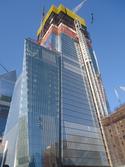My wife recently gave birth to our first child. It’s an exciting time – and also one that portends great changes for our future.
Cities are supposedly hostile to children. But living on the Upper West Side of New York, we’ve experienced nothing but oohs and ahhs over our son. The people in our neighborhood love children. And there are plenty of them around. The UWS is one of those places you could probably classify as a “strollerville.” read more »





















